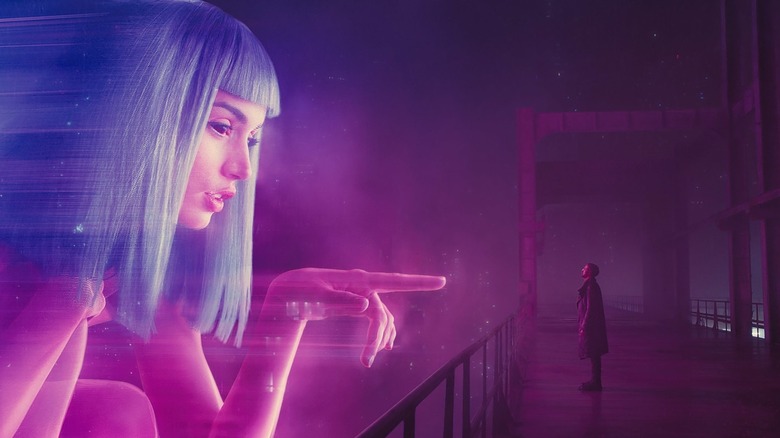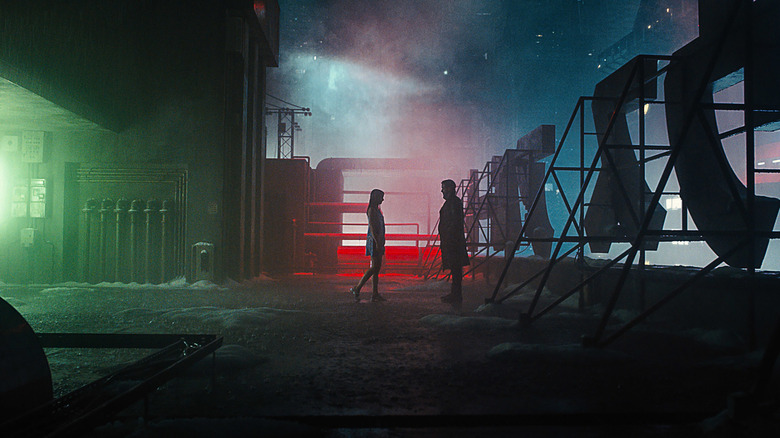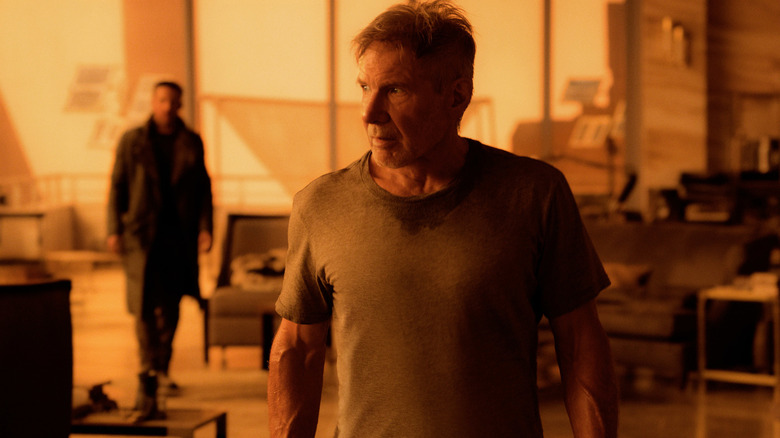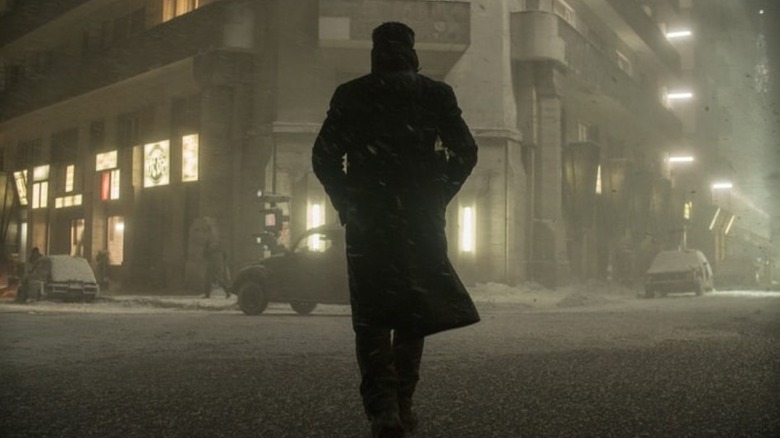Blade Runner 2049 Was Too Good To Be A Box Office Hit
The movie may only be a handful of years old but it already feels as though time has been kind to "Blade Runner 2049." The long-awaited sequel to Ridley Scott's unquestioned sci-fi classic was released in 2017 and, at the time, the narrative largely seemed to focus on the relative disappointment in regards to the movie's financial performance. Alcon Entertainment was nearly destroyed by the underperformance of the film at the box office, and Warner Bros. didn't get the chance to kick off a brand new franchise as they had certainly hoped. This made the overwhelmingly positive response to the movie all the more heartbreaking.
Yet, several years removed, the dust has settled enough that people only seem to talk about this movie in a positive light, with a touch of disappointment attached to it in expressing a longing for more. Unfortunately, with the economics of the movie business being what they are, this movie was almost doomed to fail from the start. Director Denis Villeneuve was given every resource in the world to make the "Blade Runner" sequel that sci-fi fans had dreamed of for decades. But that movie, as it turns out, was never going to be commercially viable.
The movie was a critical darling
"Blade Runner" is now viewed as a stone-cold classic of the genre but, upon its original release in 1982, Ridley Scott's adaptation of Philip K. Dick's "Do Androids Dream of Electic Sheep?" was not a success, despite having a gigantic star in Harrison Ford at its center, and the guy who made "Alien" behind the camera. It wouldn't be until years later, when "Blade Runner: The Final Cut" was released, that the movie's reputation was finally cemented. All of this to say, it was tough to know what to expect from Villeneuve, the guy behind "Prisoners" and "Arrival," in delivering a direct sequel 35 years later.
It turned out that Villeneuve was every bit the filmmaker audiences had come to suspect he was, even when working on a much larger, blockbuster scale. "Blade Runner 2049" was met with absolutely glowing reviews from critics and audiences alike. To that end, it currently boasts an 88% approval rating on Rotten Tomatoes. Beyond that, the movie was met with love from The Academy, as it earned several Oscar nominations. Most importantly, it won Best Cinematography, which got the legendary Roger Deakins his first Oscar, and a sorely-deserved one at that.
The main takeaway is that, from a purely artistic standpoint, the general consensus is that Villeneuve absolutely nailed it. From the cast, which includes Ford reprising his role as Deckard and Ryan Gosling as our new lead, as well as tremendous visual storytelling, to everything in between, this was an achievement in blockbuster-level filmmaking that only comes around every so often. So what was the problem? Well, the cost associated with this level of artistic accomplishment was far too great, and the business of it all had to come into play at some point.
Breaking down the hard numbers
"Blade Runner 2049" was released in theaters in October 2017 and pretty much right from the jump, it was clear this wasn't going to be a home run from a business perspective. With a budget north of $150 million (before marketing), the film debuted with just $32.7 million on its opening weekend, paving the way for a relatively disappointing $92 million run at the domestic box office. International audiences couldn't save this one either, as has been the case with other Hollywood films in recent history. It earned $167.1 million overseas for a grand total of $259.2 million.
Given that studios generally only see about half of the money earned from ticket sales, it's crystal clear that the sequel lost a great deal of cash. Plus, sales from physical media such as Blu-ray and DVDs are not what they used to be, meaning that secondary revenue streams weren't going to be enough to rescue this situation. To that end, "Blade Runner 2049" has generated an estimated $28.8 million in total domestic home video sales. That's not nearly enough to get this movie into the green, let alone turn it into a hit. Even with glowing praise from critics, the audience for this film was greatly overestimated by Warner Bros. and Alcon, though there was clearly an audience for it — just not the audience that big-budget blockbuster demands.
It certainly didn't help that the movie clocked in at nearly three hours, which might have turned off some more casual moviegoers. That, coupled with the fact that this was a sequel to a cult classic that was arriving more than three decades after its initial release created a recipe for financial disaster. There would be no sequel and there would be no celebration from the studio. Reality proved to be harsh, despite everyone's best intentions to deliver a worthy successor to a beloved classic.
Movies and the relative nature of financial success
Where this all went belly-up is in setting up an impossible expectation, financially speaking. When a film comes with a budget of $150 million or more, we are talking about the kind of movie that needs to make a lot of money all around the globe. Mass appeal in the truest sense. It is, in many ways, amazing that a "Blade Runner" sequel made as much money as it did. The problem is that it needed to make as much money as a mid-tier Marvel movie to be considered a true success. At the bare minimum, box office expectations for a movie of this size before the pandemic were probably somewhere in the $400 million range. Even that might not have been enough to get a sequel at the time but, in a post-pandemic world, that was enough to make "Dune: Part Two" happen. Even so, "Blade Runner 2049" fell way short of even the bare minimum.
In allowing the budget to climb as high as it did, Warner Bros. and Alcon set "Blade Runner 2049" up for failure. Granted, it probably would have been extremely difficult for Villeneuve to craft a sci-fi masterpiece of equal measure with a smaller budget, but spending all of that money didn't gather a larger audience. This comes down to simple dollars and cents, as frustrating as that may be for fans of the film to hear. The movie business, at the end of the day, is a business first and the art has to service that business.
The good news is that despite the movie bombing, it did manage to reinvigorate interest in the franchise. So much so that Ridley Scott is producing a sequel series titled "Blade Runner 2099" for Amazon. In the world of streaming, it isn't about box office and if people can watch this from the comfort of home as part of a subscription they already have, success may be in reach. That, in turn, could encourage new audiences to seek out "Blade Runner 2049." Sure, maybe it was a flop in its day, but time can continue to rewrite the larger narrative.



